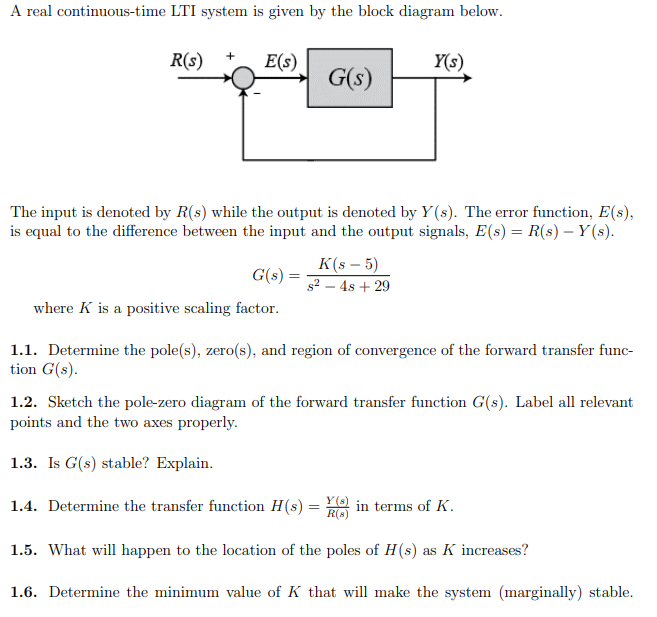A real continuous-time LTI system is given by the block diagram below. R(s) + E(s) Y(s) G(s) The input is denoted by R(s) while the output is denoted by Y(s). The error function, E(s), is equal to the difference between the input and the output signals, E(s) = R(s) – Y(s). G(s : K(s – 5) s² – 4s + 29 where K is a positive scaling factor. 1.1. Determine the pole(s), zero(s), and region of convergence of the forward transfer func- tion G(s). 1.2. Sketch the pole-zero diagram of the forward transfer function G(s). Label all relevant points and the two axes properly. 1.3. Is G(s) stable? Explain. 1.4. Determine the transfer function H(s) = 0 in terms of K. R(s) 1.5. What will happen to the location of the poles of H(s) as K increases? 1.6. Determine the minimum value of K that will make the system (marginally) stable.
A real continuous-time LTI system is given by the block diagram below. R(s) + E(s) Y(s) G(s) The input is denoted by R(s) while the output is denoted by Y(s). The error function, E(s), is equal to the difference between the input and the output signals, E(s) = R(s) – Y(s). G(s : K(s – 5) s² – 4s + 29 where K is a positive scaling factor. 1.1. Determine the pole(s), zero(s), and region of convergence of the forward transfer func- tion G(s). 1.2. Sketch the pole-zero diagram of the forward transfer function G(s). Label all relevant points and the two axes properly. 1.3. Is G(s) stable? Explain. 1.4. Determine the transfer function H(s) = 0 in terms of K. R(s) 1.5. What will happen to the location of the poles of H(s) as K increases? 1.6. Determine the minimum value of K that will make the system (marginally) stable.
Introductory Circuit Analysis (13th Edition)
13th Edition
ISBN:9780133923605
Author:Robert L. Boylestad
Publisher:Robert L. Boylestad
Chapter1: Introduction
Section: Chapter Questions
Problem 1P: Visit your local library (at school or home) and describe the extent to which it provides literature...
Related questions
Question

Transcribed Image Text:A real continuous-time LTI system is given by the block diagram below.
R(s)
+
E(s)
Y(s)
G(s)
The input is denoted by R(s) while the output is denoted by Y(s). The error function, E(s),
is equal to the difference between the input and the output signals, E(s) = R(s) – Y(s).
G(s :
K(s – 5)
s² – 4s + 29
where K is a positive scaling factor.
1.1. Determine the pole(s), zero(s), and region of convergence of the forward transfer func-
tion G(s).
1.2. Sketch the pole-zero diagram of the forward transfer function G(s). Label all relevant
points and the two axes properly.
1.3. Is G(s) stable? Explain.
1.4. Determine the transfer function H(s) = 0 in terms of K.
R(s)
1.5. What will happen to the location of the poles of H(s) as K increases?
1.6. Determine the minimum value of K that will make the system (marginally) stable.
Expert Solution
This question has been solved!
Explore an expertly crafted, step-by-step solution for a thorough understanding of key concepts.
Step by step
Solved in 3 steps with 2 images

Knowledge Booster
Learn more about
Need a deep-dive on the concept behind this application? Look no further. Learn more about this topic, electrical-engineering and related others by exploring similar questions and additional content below.Recommended textbooks for you

Introductory Circuit Analysis (13th Edition)
Electrical Engineering
ISBN:
9780133923605
Author:
Robert L. Boylestad
Publisher:
PEARSON

Delmar's Standard Textbook Of Electricity
Electrical Engineering
ISBN:
9781337900348
Author:
Stephen L. Herman
Publisher:
Cengage Learning

Programmable Logic Controllers
Electrical Engineering
ISBN:
9780073373843
Author:
Frank D. Petruzella
Publisher:
McGraw-Hill Education

Introductory Circuit Analysis (13th Edition)
Electrical Engineering
ISBN:
9780133923605
Author:
Robert L. Boylestad
Publisher:
PEARSON

Delmar's Standard Textbook Of Electricity
Electrical Engineering
ISBN:
9781337900348
Author:
Stephen L. Herman
Publisher:
Cengage Learning

Programmable Logic Controllers
Electrical Engineering
ISBN:
9780073373843
Author:
Frank D. Petruzella
Publisher:
McGraw-Hill Education

Fundamentals of Electric Circuits
Electrical Engineering
ISBN:
9780078028229
Author:
Charles K Alexander, Matthew Sadiku
Publisher:
McGraw-Hill Education

Electric Circuits. (11th Edition)
Electrical Engineering
ISBN:
9780134746968
Author:
James W. Nilsson, Susan Riedel
Publisher:
PEARSON

Engineering Electromagnetics
Electrical Engineering
ISBN:
9780078028151
Author:
Hayt, William H. (william Hart), Jr, BUCK, John A.
Publisher:
Mcgraw-hill Education,